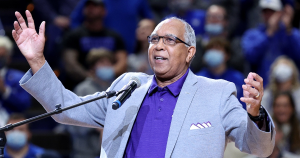Orlando “Tubby” Smith
Coach of the National NCAA Champion Kentucky Wildcats

“All we promise them is an education and the opportunity to be part of the winningest college basketball program in America,” Smith says. Smith is selling something few other elite coaches dare to even try. He’s selling selflessness.”
Tim Cowlishaw, Dallas Morning News – Mar. 26, 2005
(June 30, 1951 – )
Olando “Tubby” Smith is the sixth of 17 children born to sharecroppers Guffrie and Parthenia Smith of Scotland in St. Mary’s County, Maryland. He received his unusual nickname from his family because Tubby was fond of staying in the galvanized washtub where the children were bathed. One of Tubby’s brothers is Guffrie Smith, Jr. now living in Calvert County, Maryland.
When Tubby graduated from Great Mills High School in 1969, he accepted a basketball scholarship to the University of Maryland, but a coaching change would change his life forever. The new Maryland coach, Lefty Driesell, told Smith, a Terrapins signee, that he might be better off playing at a smaller school, like High Point College in North Carolina. It was at High Point that Smith met his wife, Donna, and his first coaching mentor, J.D. Barnett.
Graduating from High Point in 1973, Smith returned to coach and teach at Great Mills High School until 1977. His coaching record there was 46-36. From Great Mills, he became head coach of Hoke High School in North Carolina (28-18).
In 1979, Coach Smith began his college coaching journey. He started as an assistant coach at Virginia Commonwealth University (under the tutelage of his former coach and mentor J.D. Barnett). He moved on to the University of South Carolina (under George Felton-later his assistant coach at the University of Kentucky), and then he went to the University of Kentucky. At Kentucky, he worked under the guidance of Hall of Fame Coach Rick Patino.
In 1991, Coach Smith received his first head coaching job with the University of Tulsa. After a stint at the University of Georgia, in May 1997, he was named the 20th Head Coach of the Kentucky Wildcats and the first African American coach. The following year, Coach Smith became the third Black Coach to win the NCAA Division I Men’s Basketball Championship. Smith would spend the next ten years at Kentucky. He was inducted into the University of Kentucky Hall of Fame in 2013. In his 31 years as a head coach, Smith achieved 26 winning seasons.
After his time at Kentucky, Coach Smith coached at the University of Minnesota, Texas Tech, the University of Memphis, and High Point University. In addition to his collegiate duties, he was assistant coach for the 2000 Olympic Gold Medal basketball team. He retired from coaching in February 2022.
Smith was active in the Lexington, Kentucky community. He established The Tubby Smith Foundation, to assist underprivileged children. Several community centers in the area are named “Tubby’s Klubhouse” because of his work with the centers.
Additional Resources
Coach Bio: Tubby Smith :: Men’s Basketball”. University of Kentucky. Archived from the original on March 1, 2007. Retrieved April 1, 2007.
“Kentucky’s Smith Wins Phelan Award”. CollegeInsider.com. April 4, 2005. Retrieved January 12, 2007.
“Tubby Smith named new men’s basketball coach at High Point University; new arena location announced”. March 27, 2018.
